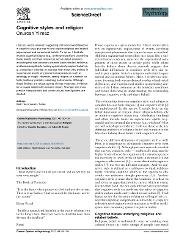| dc.contributor.author | Yılmaz, Onurcan | |
| dc.date.accessioned | 2020-12-02T11:46:17Z | |
| dc.date.available | 2020-12-02T11:46:17Z | |
| dc.date.issued | 2021 | |
| dc.identifier.issn | 2352-250X | en_US |
| dc.identifier.uri | https://hdl.handle.net/20.500.12469/3505 | |
| dc.identifier.uri | https://doi.org/10.1016/j.copsyc.2020.09.014 | |
| dc.description.abstract | I discuss recent research suggesting that individual differences in cognitive style give rise to and explain religious and related supernatural and paranormal beliefs. To do so, I illustrate intuitive cognitive biases (e.g., anthropomorphism) underlying these beliefs and then review the accumulated evidence indicating that non-believers are more open-minded, reflective, and less susceptible to holding epistemically suspect beliefs (e.g., conspiracy theories) on average than those who believe in supernatural events or paranormal experiences such as astrology or magic. However, seeing religion as a search for truth positively predicts reasoning performance. Although these findings are robust across diverse measures, evidence for a causal relationship remains mixed. Stronger and more precise manipulations and cross-cultural investigations are needed. | en_US |
| dc.language.iso | eng | en_US |
| dc.publisher | Elsevier B.V. | en_US |
| dc.rights | info:eu-repo/semantics/embargoedAccess | en_US |
| dc.subject | N/A | en_US |
| dc.title | Cognitive styles and religion | en_US |
| dc.type | review | en_US |
| dc.identifier.startpage | 150 | en_US |
| dc.identifier.endpage | 154 | en_US |
| dc.relation.journal | Current Opinion in Psychology | en_US |
| dc.identifier.issue | 40 | en_US |
| dc.department | Fakülteler, İktisadi, İdari ve Sosyal Bilimler Fakültesi, Psikoloji Bölümü | en_US |
| dc.identifier.wos | WOS:000685656300028 | en_US |
| dc.identifier.doi | 10.1016/j.copsyc.2020.09.014 | en_US |
| dc.identifier.scopus | 2-s2.0-85094615939 | en_US |
| dc.institutionauthor | Yılmaz, Onurcan | en_US |
| dc.relation.publicationcategory | Diğer | en_US |
| dc.identifier.pmid | 33130329 | en_US |
















